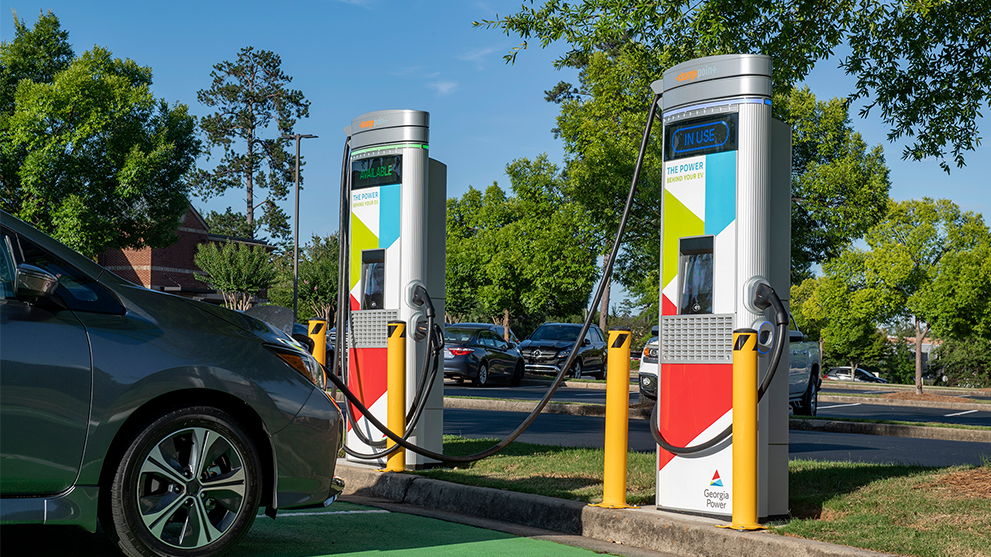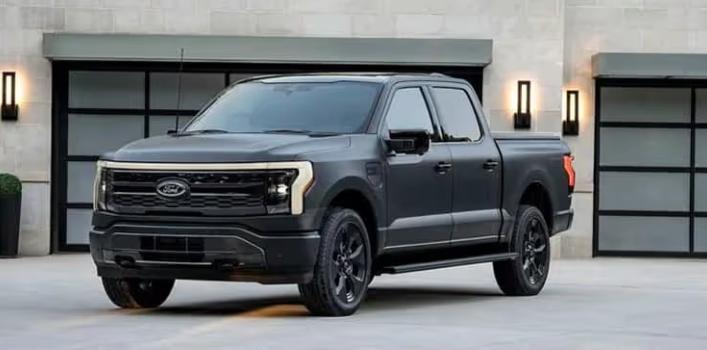Table des matières
Crédit d'impôt, remises et incitations pour les véhicules électriques en Géorgie
Rabais sur les bornes de recharge pour véhicules électriques en Géorgie
Tarifs de recharge pour véhicules électriques en Géorgie
La Géorgie est devenue un acteur clé de la promotion des véhicules électriques (VE), offrant une gamme de crédits d'impôt et d'incitations pour aider les habitants à adopter des modes de transport plus propres. Des allégements fiscaux importants à l'achat de nouveaux véhicules électriques aux remises pour l'installation de bornes de recharge à domicile, les incitations géorgiennes visent à réduire les obstacles financiers à la transition écologique. Dans cet article, nous détaillerons les crédits d'impôt et les programmes de recharge pour VE en Géorgie, et vous expliquerons comment économiser tout en contribuant à un avenir plus durable. Prêt à rouler plus propre et à économiser ? Découvrons ce que la Géorgie a à offrir.
Crédit d'impôt, remises et incitations pour les véhicules électriques en Géorgie

Bien qu'il n'existe actuellement aucun crédit d'impôt ou rabais pour les véhicules électriques au niveau de l'État, les résidents de Géorgie bénéficient d'un secteur privé fort qui stimule l'essor de l'électrification avec des programmes clés pour aider à réduire le coût du passage à l'électrique.
De plus, avec les économies offertes par les services publics locaux et les diverses incitations offertes par l'État (comme les économies sur l'achat d'un chargeur de véhicule électrique), ainsi que les allocations de conduite de véhicule électrique offertes par l'État, il existe de nombreuses raisons d'acheter un véhicule électrique en Géorgie.
Exemptions pour les voies réservées aux véhicules multioccupants et aux véhicules à haut rendement
En tant que propriétaire d'un véhicule électrique, vous pouvez économiser temps et argent en utilisant les voies réservées aux véhicules multioccupants (VMO) sur l'autoroute, quel que soit le nombre de passagers à bord. De plus, avec un PeachPass, vous pouvez utiliser gratuitement les voies réservées aux véhicules multioccupants (VMO).
Rabais des services publics pour les voitures électriques en Géorgie
Trois services publics de Géorgie proposent des incitations pour les véhicules électriques sous forme de crédits de facture, ce qui vous permet d'économiser plus facilement sur l'achat de votre véhicule électrique.
La Carroll Electric Membership Cooperative propose un programme « Conduisez gratuitement pendant un an » . Pour y participer, achetez un véhicule électrique à batterie (VEB) neuf et recevez un crédit d'énergie de 30 $ par mois pendant la première année de possession, soit 360 $ d'économies d'énergie par an.
Le Snapping Shoals EMC propose un programme incitatif similaire pour les véhicules électriques. Ce programme est disponible pour l'achat et la location de véhicules neufs et offre un crédit mensuel de 30 $ destiné à couvrir les frais de recharge de votre véhicule pendant la première année de possession.
Les clients résidentiels de Tri-County EMC peuvent également bénéficier d'incitations similaires en se qualifiant pour le programme EV365, qui offre un crédit de facture mensuel de 30 $ pendant la première année de possession d'un véhicule électrique.
Rabais sur les bornes de recharge pour véhicules électriques en Géorgie

Rabais des services publics de Géorgie pour les bornes de recharge et l'installation de véhicules électriques de niveau 2
Avec 2,5 millions de clients, Georgia Power Company (GPC) est le plus grand fournisseur d'énergie de l'État. Si vous êtes un client résidentiel, vous pouvez recevoir jusqu'à 150 $ pour une borne de recharge de niveau 2 , soit en l'achetant directement sur le site web de GPC , soit en fournissant une preuve d'achat. De plus, bien que GPC propose des tarifs de recharge pour véhicules électriques, l'immatriculation n'est pas obligatoire pour bénéficier de la remise sur les véhicules électriques en Géorgie.
Le Carroll EMC offre une remise de 250 $ pour réduire le coût d'installation d'une borne de recharge pour véhicules électriques de niveau 2. Notez que vous devez adhérer au programme « Conduisez gratuitement pendant un an » du service public pour y être admissible, ce qui vous permet d'économiser 610 $ au total.
Si vous êtes client Cobb EMC , vous pourriez bénéficier d'une remise de 250 $ à l'achat d'une nouvelle borne de recharge pour véhicules électriques de niveau 2 si vous choisissez un modèle certifié Energy Star avec fonctionnalités connectées. En demandant cette remise, vous serez automatiquement inscrit au programme de recharge pour véhicules électriques du fournisseur.
Avec le Coweta-Fayetteville EMC , vous pouvez gagner 100 $ pour un chargeur EV de niveau 2 pour la recharge à domicile.
Pour ceux qui planifient un nouveau projet de construction résidentielle, Diverse Power offre une remise de 50 $ pour chaque prise NIMA 14-30 ou 14-50 pour vous aider à construire une maison prête pour les véhicules électriques.
La GreyStone Power Corporation soutient l'électrification par le biais d'un programme qui offre une remise de 250 $ sur le chargeur de véhicule électrique en Géorgie pour l'installation d'un chargeur de niveau 2 pour la recharge de véhicule électrique à domicile.
Jackson EMC propose un programme similaire qui offre une remise de 250 $ pour l'installation d'un chargeur de véhicule électrique de niveau 2 à domicile lorsque vous remplissez le formulaire de demande du service public.
Les clients résidentiels de Sawnee EMC bénéficient d'une remise de 200 $ pour les bornes de recharge de niveau 2. Vous devez être abonné au forfait véhicule rechargeable du fournisseur d'électricité depuis au moins un an pour bénéficier de cette remise.
Snapping Shoals EMC est un autre service public de Géorgie qui offre une remise de 250 $ pour les chargeurs de véhicules électriques de niveau 2.
En tant que client de Sumter EMC , vous pouvez bénéficier d'une remise de 250 $ sur les chargeurs de niveau 2 pour économiser sur le coût initial de recharge de votre véhicule électrique à domicile.
Tri-County EMC propose un programme de remise qui permet d'économiser 250 $ sur les chargeurs EV de niveau 2.
La ville de LaGrange est actuellement la seule communauté d'électrification de la MEAG à proposer un programme d'incitation pour les véhicules électriques en Géorgie. Ce programme offre une remise de 250 $ sur l'achat d'une borne de recharge de niveau 2 pour un usage résidentiel.
Crédit d'impôt pour bornes de recharge pour véhicules électriques pour les entreprises
Les entreprises peuvent demander un crédit d'impôt pouvant atteindre 2 500 $ (jusqu'à 10 %) pour couvrir une partie des coûts d'installation d'une borne de recharge pour véhicules électriques. Ce crédit s'applique aux bornes de recharge rapide de niveau 2 et CC.
Programmes de rabais pour les services publics non résidentiels pour les bornes de recharge pour véhicules électriques
Les propriétaires d’entreprise peuvent économiser de l’argent sur les programmes de recharge de véhicules électriques en profitant de trois incitations pour véhicules électriques en Géorgie.
Le premier programme est proposé par Georgia Power Company, le plus grand fournisseur d'énergie de Géorgie. Il utilise une structure échelonnée pour déterminer le montant des remises pour véhicules électriques en Géorgie. Si votre entreprise installe cinq bornes de recharge de niveau 2 ou moins, vous pouvez recevoir jusqu'à 2 000 $ pour l'ensemble du programme, plafonné à 50 $ par kWh.
Pour les projets d'installation de bornes de recharge pour véhicules électriques commerciaux comprenant au moins six bornes de niveau 2, Georgia Power offre une remise de 250 $ par kWh, plafonnée à 20 000 $ par projet et à 40 000 $ par an. De plus, si vous installez une ou plusieurs bornes de recharge rapide CC, votre entreprise peut bénéficier d'une remise de 100 $ par kWh, plafonnée à 20 000 $ pour l'ensemble du projet et à 40 000 $ par an.
Le Cobb EMC propose un autre programme de remise pour les bornes de recharge pour véhicules électriques non résidentiels. Les entreprises peuvent demander des subventions allant de 500 $ à 5 000 $, selon l'ampleur du projet et les fonds disponibles. Veuillez noter que votre projet de recharge doit être accessible au public pour être admissible à ce programme de remise.
De plus, si vous êtes un client commercial de Sumter EMC , une remise de 500 $ par chargeur est disponible pour la charge rapide de niveau 2 et CC.
Tarifs de recharge des véhicules électriques en Géorgie

Neuf services publics de Géorgie proposent des programmes d'utilisation en fonction de l'heure, ce qui signifie que vous paierez un tarif inférieur si vous déplacez votre consommation d'énergie vers les heures creuses, ce qui peut vous aider à économiser davantage sur les coûts de recharge des véhicules électriques en vous branchant la nuit ou lorsque la demande d'électricité est faible.
Georgia Power Company propose deux options aux clients résidentiels. Vous pouvez souscrire à l'offre horaire et payer 0,137 $ par kWh pendant les heures de pointe, de 14 h à 19 h en semaine, ou 0,0146 $ par kWh en heures creuses, lorsque la demande est plus élevée. Gardez à l'esprit que la recharge pendant les heures de pointe peut entraîner des coûts supplémentaires et que vous paierez des frais de demande pouvant atteindre 11,70 $ par kWh. Il est donc important d'étaler votre consommation d'électricité.
Le forfait Avantage Nuit est une autre offre incitative conçue par Georgia Power pour les propriétaires de véhicules électriques. Ce système de facturation permet de réduire les frais liés à la demande en échange d'un tarif au kWh légèrement supérieur. Dans le cadre de ce programme, vous paierez 0,286 $ par kWh en heures pleines, 0,096 $ par kWh en heures creuses et seulement 0,021 $ par kWh en heures super creuses, de 23 h à 7 h.
Georgia Power Company propose différents forfaits commerciaux selon la taille de l'entreprise. Pour les moyennes entreprises, le tarif en heures pleines est de 0,237 $ par kWh et le tarif en heures creuses de 0,059 $ par kWh.
Pour les petites entreprises, le tarif en heures de pointe est de 0,236 $ par kWh et le tarif hors pointe est de 0,1118 $ par kWh, qui tombe à 0,042 $ par kWh pour une consommation supérieure à 1 500 kWh d'octobre à mai, ce qui peut permettre de réaliser des économies supplémentaires pour la recharge de la flotte.
La Coastal Electric Cooperative propose un programme de recharge en fonction de l'heure d'utilisation à un tarif de 0,20 $ par kWh pendant les heures de pointe et de seulement 0,05 $ par kWh pendant les heures creuses de 22 h à 6 h, ce qui signifie que la recharge de nuit peut vous aider à économiser jusqu'à 75 % sur les besoins en carburant de votre véhicule !
En tant que client résidentiel de Cobb EMC, vous pouvez adhérer au programme NiteFlex et recevoir jusqu'à 400 kWh d'énergie gratuite par mois. Une fois inscrit, les 400 premiers kWh consommés entre minuit et 6 h sont gratuits ; au-delà, vous devrez payer 0,05 $ par kWh. Le programme inclut également un tarif de 0,075 $ en heures creuses entre 6 h et 13 h et entre 21 h et minuit.
Les clients commerciaux peuvent s'inscrire au programme pilote Cobb EMC pour la recharge des véhicules électriques et, en déplaçant la recharge vers les heures creuses, votre entreprise peut réduire le coût de la recharge des véhicules électriques d'environ 33 %.
Coweta-Fayeteville EMC propose un programme de recharge horaire avec un tarif exceptionnel en heures creuses à partir de 0,065 $ par kWh. En heures creuses, vous paierez 0,095 $ par kWh ; si vous rechargez votre véhicule électrique en heures de pointe, vous paierez 0,30 $ par kWh.
Le service public dispose également d'un système à plusieurs niveaux pour les tarifs d'électricité commerciale , ce qui signifie que plus vous utilisez d'énergie, plus vous économisez sur votre tarif par kWh, ce qui est idéal pour la recharge de la flotte.
Si vous êtes électricien chez Flint Energies , vous pouvez souscrire au tarif VE de l'entreprise. Vous paierez un forfait de base de 35 $ par mois et bénéficierez d'un tarif super-hors pointe de 0,05 $ par kWh si vous rechargez votre véhicule entre minuit et 6 h. Vous bénéficierez également d'un tarif hors pointe de 0,05 $ par kWh si vous rechargez votre véhicule entre minuit et 6 h. Le programme comprend également des tarifs hors pointe de 0,09 $ par kWh de 6 h à 14 h et de 20 h à minuit. De plus, vous bénéficierez d'un crédit de facture de 25 $ la première année et de 8 $ supplémentaires par mois pour certains modèles de véhicules électriques si vous rechargez votre véhicule la nuit.
GreyStone Power Corporation propose un tarif spécial pour la recharge de véhicules électriques. Pendant les heures creuses, de minuit à 7 h, vous ne paierez que 0,04 $ par kWh, soit 80 % moins cher que la recharge aux heures creuses pendant les mois d'été, de 14 h à 20 h.
Jackson EMC propose un tarif de recharge pour véhicules électriques à ses clients résidentiels, au cas par cas. Si votre demande est approuvée, vous bénéficierez d'un forfait mensuel de 30 $, avec un tarif de pointe de 0,34 $ par kWh, un tarif hors pointe de 0,07 $ par kWh et un tarif super pointe de 0,06 $ par kWh.
Les clients professionnels peuvent également souscrire à un programme de tarification horaire auprès de Jackson EMC. Le forfait mensuel est de 49 $ pour les clients monophasés et de 77 $ pour les clients triphasés. Vous paierez 0,34 $ par kWh en heures pleines et 0,15 $ par kWh en heures creuses.
Sawnee EMC propose plusieurs formules de tarification horaire. Vous pouvez choisir une formule standard avec un tarif en heures creuses de 0,0445 $ par kWh et un tarif en heures pleines de 0,335 $ par kWh, ou opter pour la formule de tarification pour les heures de pointe, avec un tarif légèrement inférieur en heures pleines et un tarif de 0,95 $ par kWh en heures pleines.
Le fournisseur propose également un programme de recharge pour véhicules électriques , qui nécessite un deuxième compteur pour suivre votre charge. Avec ce programme, vous paierez 0,04 $ par kWh pour la recharge en heures creuses et 0,28 $ par kWh pour la recharge en heures de pointe.
Les crédits d'impôt et les incitations à la recharge pour véhicules électriques en Géorgie sont un excellent moyen de rendre l'acquisition d'un véhicule électrique plus abordable et accessible. Grâce à des programmes visant à réduire le coût initial d'achat d'un véhicule électrique et à faciliter l'installation de bornes de recharge à domicile, l'État facilite la transition écologique des conducteurs. Que vous conduisiez déjà un véhicule électrique ou que vous envisagiez de changer, ces incitations peuvent réduire considérablement vos coûts. Ne manquez pas cette occasion d'économiser : profitez du soutien croissant de la Géorgie aux transports propres et profitez dès aujourd'hui des nombreux avantages de la conduite électrique.
Voir plus de blogs sur la taxe EV sur le site officiel d'EVDANCE.








Partager:
Branchez-vous sur les bénéfices : découvrez les crédits d'impôt et les incitations à la recharge pour véhicules électriques dans l'État de Washington
Volkswagen ID.2 : redéfinir les véhicules électriques abordables avec style et innovation